Civilian Pilots Caught in History’s Path.

Six civilian aircraft were airborne during the Pearl Harbor attack. Three were students with their instructrs, and three were rented by sightseeing pilots and passengers. All but one came under attack by Japanese aircraft. Two planes were shot down, and those three airmen are still missing.
In Hawaii, the first step in the U.S. Government’s 1938 Civilian Pilot Training Program (CPTP) was the ground school held at the University of Hawaii. Schooling included navigation, aerodynamics, and meteorology. Then came flight training at John Rodgers Field (now Honolulu International Airport). CPTP became a mecca for many aspiring pilots due to government funding. Aircraft owners began giving lessons, and flying clubs were formed.
Three flying service operators—Andrew Flying Service, Gambo Flying Service, and K-T Flying Service—were sales representatives stocked with Interstate Cadets, Aeroncas, and Piper Cubs, respectively. Logically, new students were encouraged to get instruction in the aircraft that they might purchase. For instance, Olin Andrew sold the Underground Flying Club an Interstate Cadet. Marguerite Gambo obtained an Aeronca for the Honolulu Junior Chamber of Commerce, whose Hui Lele Flying Club was a favorite, with some 27 members. On the “Big Island” of Hawaii, the Hilo Flying Club purchased a Piper Cub from Robert Tyce, co-owner of K-T.
The Three Students
James Duncan, 24, a mechanic from San Francisco, California; Ernest E. Suomala, 31, a sheetmetal pattern maker from Athol, Massachusetts; and Raymond J. Oderwald, 28, an iron worker from New York City, went to Hawaii as contract workers. They were the student pilots airborne during the Pearl Harbor attack.
Esta historia es de la edición December 2016 de Flight Journal.
Comience su prueba gratuita de Magzter GOLD de 7 días para acceder a miles de historias premium seleccionadas y a más de 9,000 revistas y periódicos.
Ya eres suscriptor ? Conectar
Esta historia es de la edición December 2016 de Flight Journal.
Comience su prueba gratuita de Magzter GOLD de 7 días para acceder a miles de historias premium seleccionadas y a más de 9,000 revistas y periódicos.
Ya eres suscriptor? Conectar

Keeping 'em Flying!- The new generation of warbird pilots, restorers and mechanics
The new generation of warbird pilots, restorers and mechanics. Nearly 80 years after the end of World War II, the fighters, bombers, and trainers that defended freedom continue to enthrall and inspire audiences at airshows, thanks to generations of warbird pilots, maintainers, restoration specialists and collectors. In our September, 2022 issue we introduced you to the young warbird pilots, maintainers and restorers who are already beginning to displace more "experienced" warbird fliers and fixers.

The Corsair Maker- Bringing the Vought Corsair to the fleet was a daunting challenge that spanned nearly three years.
When the first production Corsairs exited the Stratford factory in June 1942, Guyton, as seen here, was tapped to manage the flight and production test program. Armament was improved to six wing-mounted .50s, displacing the wing fuel tanks now placed forward of the cockpit which necessarily was moved rearward by 32 inches. Overall length was increased, armor plate added, landing, arresting and tail gear improved, aileron control enhanced, and a new version of the R2800 engine was incorporated. But those significant improvements unearthed numerous idiosyncrasies that would take an extended period to make the Corsair acceptable for carrier operations
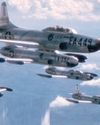
STARFIRES Over Korea
F-94 pilots tangle with MiGs
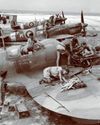
Training Mission
BY THE TIME THIS TRAINING SCENE WAS RECORDED in Canne, Italy, in July 1944, Allied Yugoslavian airmen had several years of experience working side by side with the RAF.
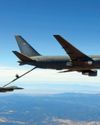
KC-46A PEGASUS
Next generation aerial refueler
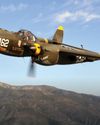
"SATAN'S ANGELS" ACE - Tales from a P-38 pilot in the South Pacific
\"AS A KID GROWING UP on the bow of my father's tugboat, hauling oil from Seattle to Alaska, I had a lot of time on my hands.
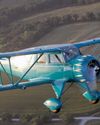
WACO YKC - Stunning and Ultra Rare Golden Age Cabin Flier
BETWEEN THE IMPLEMENTATION of the Air Commerce Act of 1926 and December 31, 1948, all U.S. registered flying machines sported an N-number, much as they do today, the \"N\" being an internationally recognized identifier for the United States. During that period, however, an additional letter-identifier followed the \"N.\" Depending on their category, they were registered in the NC (Commercial), NG (Glider), NL (Limited), NR (Restricted, usually meaning race airplanes), NS (State government), and, finally, NX (experimental).
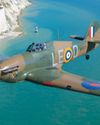
BADER'S HURRICANES
Double amputee fighter ace Douglas Bader and his Battle of Britain Hurricanes
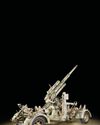
Scourge of the Allied Fighters
IT HAD TO BE THE MOST HELPLESS FEELING in the world: you're at 25,000 feet over Europe knowing that your primary function is to drop bombs-or flying escort for the bombers while being a slow-moving target for some of the world's finest shooters. However, you have John Browning's marvelous .50 caliber invention to give some degree of protection. Unfortunately, you're absolutely helpless against flak. Piloting and gunnery skills play no role in a game where sheer chance makes life and death decisions. For that reason, the Krupp 88 mm Flak 18/36/37 AA cannon could be considered WW II's ultimate stealth fighter. You never saw it coming.
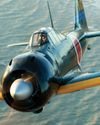
ZERO MYTH, MYSTERY, AND FACT
A test pilot compares the A6M5 Zero to U.S. fighters